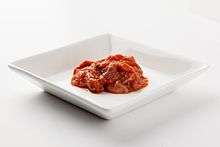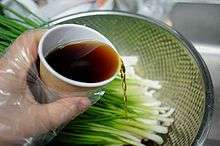Jeotgal
| ||||
| Alternative names | Jeot, salted seafood | |||
|---|---|---|---|---|
| Course | Banchan | |||
| Place of origin | Korea | |||
| Associated national cuisine | Korean cuisine | |||
| Main ingredients | Seafood, salt | |||
| Similar dishes | Shiokara | |||
|
| ||||
| Korean name | |
| Hangul | 젓 / 젓갈 |
|---|---|
| Hanja | n/a |
| Revised Romanization | jeot / jeotgal |
| McCune–Reischauer | chŏt / chŏtkal |
| IPA | [tɕʌt̚] / [tɕʌt̚.k͈al] |
| Liquid jeotgal | |
| Hangul | 액젓 |
| Hanja | 液- |
| Revised Romanization | aekjeot |
| McCune–Reischauer | aekchŏt |
| IPA | [ɛk̚.tɕʌt̚] |
 |
| This article is part of a series on |
| Korean cuisine 한국 요리 조선 료리 |
|---|
|
Staples |
|
|
Jeotgal (젓갈) or jeot (젓), translated as salted seafood, is a category of salted fermented dishes made with seafood such as shrimps, oysters, clams, fish, and roes.[1][2][3] Depending on the ingredients, jeotgal can range from flabby, solid pieces to clear, broth-like liquid. Solid jeotgal are usually eaten as banchan (side dish). Liquid jeotgal, called aekjeot (액젓) or fish sauce, is popularly used in kimchi seasoning, as well as in various soups and stews (guk, jijimi, jjigae).[4] As a condiment, jeotgal with smaller bits of solid ingredients such as saeu-jeot (shrimp jeotgal) are commonly served as a dipping sauce with pork dishes (bossam, jokbal, samgyeopsal), sundae (Korean sausage), hoe (raw fish), and several soups and stews.
History
Neolithic shell middens show that the people in Korean Peninsula ate various marine animals. Fermented foods were widely available in Three Kingdoms of Korea, as Sānguózhì, a Chinese historical text published in 289, mentioned that "The Goguryeo people [referring to the Korean people] are skilled in making fermented foods such as wine, soybean paste and salted and fermented fish" in the section named Dongyi in the Book of Wei.[5][6] The first Korean record of jeotgal appeared in Samguk Sagi, mentioning that King Sinmun offered rice, wine, jerky, and jeotgal as wedding presents in 683.[7] In 1124, a Song Chinese envoy wote that jeotgal was enjoyed by high and low alike in Goryeo.[8] 24 types of jeotgal appear in Miam ilgi, a 16th century diary written by a Joseon literatus,[9] and over 180 types of jeotgal can be found in the coeval books Gosa chwaryo and Swaemirok,[10][11] and in 17‒18th century books Eumsik dimibang, Sallim gyeongje, and Jeungbo sallim gyeongje.[12][13][14]
Types
The types of jeotgal vary depending on main ingredients, regions, and family and personal preferences. In past times, due to the limited transportation, regions near seas had more types of jeot compared to the inland areas.
Fish (fish innards and roe)
- Baendaengi-jeot (밴댕이젓) – salted sardinella
- Baengeo-jeot (뱅어젓) – salted baby prickleback
- Biut-jeot (비웃젓) – salted herring
- Bolak-jeot (볼락젓) – salted rockfish
- Byeongeo-jeot (병어젓) – salted silver pomfret
- Changnan-jeot (창난젓) – salted pollock innards
- Cheongeo-al-jeot (청어알젓) – salted herring roe
- Daegu-al-jeot (대구알젓) – salted cod roe
- Daegu-iri-jeot (대구이리젓) – salted cod milt
- Daechang-jeot (대창젓) – salted cod innards
- Domi-jeot (도미젓) – salted sea bream
- Dorumuk-jeot (도루묵젓) – salted sandfish
- Euneo-al-jeot (은어알젓) – salted sweetfish roe
- Gajami-jeot (가자미젓) – salted righteye flounder
- Galchi-jeot (갈치젓) – salted hairtail
- Galchi-sok-jeot (갈치속젓) – salted hairtail innards
- Gangdari-jeot (강달이젓) – salted bighead croaker
- Godeungeo-naejang-jeot (고등어내장젓젓) – salted chub mackerel innards
- Goji-jeot (고지젓) – salted pollock milt
- Gwangnan-jeot (광란젓) – salted olive flounder roe
- Ingeo-jeot (잉어젓) – salted carp
- Jangjae -jeot (장재젓) – salted cod gill
- Jari-jeot (자리젓) – salted pearl-spot chromis
- Jeoneo-bam-jeot (전어밤젓) – salted gizzard shad tripe
- Jeoneo-jeot (전어젓) – salted gizzard shad
- Jeongeori-jeot (정어리젓) – salted sardine
- Jogi-agami-jeot (조기아가미젓) – salted yellow croaker gill
- Jogi-al-jeot (조기알젓) – salted yellow croaker roe
- Jogi-jeot (조기젓) – salted yellow croaker
- Junchi-jeot (준치젓) – salted ilisha
- kkongchi-jeot (꽁치젓) – salted saury
- Maegari-jeot (매가리젓) – salted jack mackerel
- Myeolchi-jeot (멸치젓) – salted anchovy
- Myeongnan-jeot (명란젓) – salted pollock roe
- Myeongtae-agami-jeot (명태아가미젓젓) – salted pollock gill
- Nansa-jeot (난사젓) – salted baby sandlance
- Neungseongeo-jeot (능성어젓) – salted grouper
- Obunjagi-jeot (오분자기젓) – salted baby abalone
- Sokjeot (속젓) – salted yellow croaker innards
- Sungeo-al-jeot (숭어알젓) – salted mullet roe
- Taean-jeot (태안젓) – salted pollock eye
- Ttora-jeot (또라젓) – salted mullet innards
- Ungeo-jeot (웅어젓) – salted grenadier anchovy
- Yeoneo-al-jeot (연어알젓) – salted salmon roe
- Yeopsak-jeot (엽삭젓) – salted gizzard shad tripe
Shellfish and other marine animals
- Bajirak-jeot (바지락젓) – salted Manila clam
- Bangge-jeot (방게젓) – salted thoracotrematan crab
- Daeha-jeot (대하젓) – salted fleshy prawn
- Daehap-jeot (대합젓) – salted oriental clam
- Dongjuk-jeot (동죽젓) – salted astarte
- Gaetgajae-jeot (갯가재젓) – salted mantis shrimp
- Ge-al-jeot (게알젓) – salted crab roe
- Gejang (게장) – salted crab
- Geut-jeot (게웃젓) – salted abalone innards
- Gonjaengi-jeot (곤쟁이젓) – salted mysid shrimp
- Guljeot (굴젓) – salted oyster
- Haesam-chang-jeot (해삼창젓) – salted sea cucumber innards
- Haesam-jeot (해삼젓) – salted sea cucumber
- Hanchi-jeot (한치젓) – salted mitre squid
- Haran-jeot (하란젓) – salted shrimp roe
- Honghap-jeot (홍합젓) – salted mussel
- Jeonbok-jeot (전복젓) – salted abalone
- Jogae-jeot (조개젓) – salted clam
- Kkolttugi-jeot (꼴뚜기젓) – salted baby squid
- Kkotge-jeot (꽃게젓) – salted blue crab
- Matjeot (맛젓) – salted razor clam
- Meongge-jeot (멍게젓) – salted sea pineapple
- Mosijogae-jeot (모시조개젓) – salted venus clam
- Nakji-jeot (낙지젓) – salted octopus
- Ojingeo-jeot (오징어젓) – salted squid
- Pijogae-jeot (피조개젓) – salted blood clam
- Saengi-jeot (생이젓) – salted freshwater shrimp
- Saeu-jeot (새우젓) – salted shrimp
- Seha-jeot (세하젓) – salted glass shrimp
- Seongge-al-jeot (성게알젓) – salted sea urchin roe
- Seongge-jeot (성게젓) – salted sea urchin
- Sora-jeot (소라젓) – salted horned turban
- Tohwa-jeot (토화젓) – salted estuarine oyster
Gallery
.jpg) changnan-jeot (salted pollock innards)
changnan-jeot (salted pollock innards).jpg) ganjang-gejang (marinated crab)
ganjang-gejang (marinated crab).jpg) guljeot (salted oyster)
guljeot (salted oyster).jpg) myeongnan-jeot (salted pollock roe)
myeongnan-jeot (salted pollock roe).jpg) ojingeo-jeot (salted squid)
ojingeo-jeot (salted squid)_jeotgal_(Caridea)_3.jpg) saeu-jeot (salted shrimp)
saeu-jeot (salted shrimp).jpg) myeolchi-jeot (salted anchovy)
myeolchi-jeot (salted anchovy) jogi-jeot (salted yellow croaker)
jogi-jeot (salted yellow croaker)
See also
| Wikimedia Commons has media related to Jeotgal. |
References
- ↑ "Jeotgal". Korea Tourism Organisation. Archived from the original on 2004-04-23.
- ↑ "jeotgal" 젓갈 [salted seafood]. Korean–English Learners' Dictionary. National Institute of Korean Language. Retrieved 29 March 2017.
- ↑ "jeot" 젓 [salted seafood]. Korean–English Learners' Dictionary. National Institute of Korean Language. Retrieved 29 March 2017.
- ↑ "aekjeot" 액젓. Standard Korean Language Dictionary (in Korean). National Institute of Korean Language. Retrieved 29 March 2017.
- ↑ Hui, Y. H.; Ghazala, Sue; Graham, Dee M.; Murrell, K. D.; Nip, Wai-Kit, eds. (2004). Handbook of Vegetable Preservation and Processing. New York: Marcel Dekker. pp. 190–191. ISBN 0824743016.
- ↑ Chén, Shòu. "Wūwán Xiānbēi Dōngyí chuán 烏丸鮮卑東夷傳" (in Literary Chinese). Sānguózhì 三國志 [Records of the Three Kingdoms]. Jin China: Wikisource.
- ↑ Busik, Gim (1145) (in Literary Chinese). Samguk Sagi 삼국사기(三國史記) [History of the Three Kingdoms]. Goryeo Korea: Wikisource.
- ↑ Xú, Jīng (1124) (in Literary Chinese). Xuānhé fèngshǐ gāolì tújīng 宣和奉使高麗圖經 [Illustrated Account of Goryeo]. Song China: Wikisource.
- ↑ Yu, Huichun (1577). Miam ilgi 미암일기(眉巖日記) [Diary of Miam]. Joseon Korea.
- ↑ Eo, Sukgwon (1554). Gosa chwaryo 고사촬요(攷事撮要) [Selected Essentials on Verified Facts]. Joseon Korea.
- ↑ O, Huimun (1601). Swaemirok 쇄미록(瑣尾錄) [Records of a Refugee]. Joseon Korea.
- ↑ Jang, Gyehyang (1670). Eumsik dimibang 음식디미방 [Guidebook of Homemade Food and Drinks] (in Middle Korean). Andong, Joseon Korea.
- ↑ Hong, Manseon. Sallim gyeongje 산림경제(山林經濟) [Farm Management] (in Literary Chinese). Joseon Korea – via DB of Korean classics by ITKC.
- ↑ Yu, Jungrim; Hong, Manseon (1766). Jeungbo sallim gyeongje 증보산림경제(增補山林經濟) [Revised and Augmented Farm Management]. Joseon Korea.

